US election: 10 oddities explained
- Published
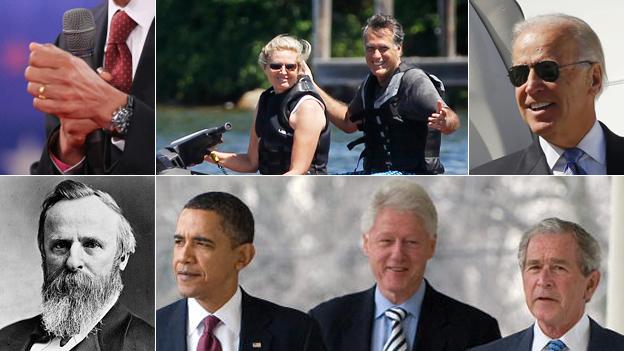
You've heard their policies, but what about the other questions? Like what's that jabbing gesture Obama makes with his thumb? And why are "Mr President" and "Mr Speaker" titles kept for life?
We examine 10 of the lesser-spotted things about American presidential politics - and about this campaign.
Why is Election Day always a Tuesday?
Even though America's voter turnout is among the lowest in mature democracies and more than a quarter of people who do not vote claim they are too busy, efforts to move elections to weekends have failed.
The Tuesday after the first Monday in November was set as presidential election day in 1845.
In the mid-19th Century, the US was an agrarian nation and it simply took a lot of time for farmers to drive the horse and buggy to the nearest polling place.
Saturday was a workday on the farm, travel on Sunday was out, and Wednesday was a market day. That left Tuesday.
The sunglasses thing
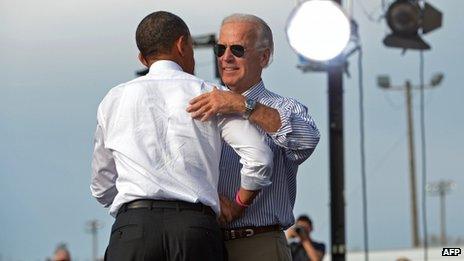
Anything strike you as unusual about this picture? Yes, Joe Biden is wearing sunglasses at an election rally.
Politicians are almost never photographed wearing sunglasses, especially during election campaigns and even at leisure.
Obama plays golf with the sun glaring in his eyes, and this summer, Romney was photographed on the back of a jet ski on a lake in New Hampshire, bare-eyed though his wife Ann wore sunglasses.

No shades - don't mind the glare
If a person's eyes are hidden, people trust them less, says Parker Geiger, an Atlanta executive image consultant.
"You just don't get a sense of the individual," he says. "There's no eye contact - that's how you build trust. Sunglasses put a barrier between you and the other person. They say eyes are the windows of the soul, and if I can't see your soul how can I trust you?"
In Nevada, you can vote for 'none of the above'
Don't like the goods in the shop window? Don't make the purchase.
The US state of Nevada allows voters to mark "None of these candidates" on the ballot.
The option has been on the ballot since 1976 and plenty of voters have used it.
In 2010 after a particularly brutish campaign for a US Senate seat, 2.25% of voters chose "None" rather than pick incumbent Democrat Harry Reid or Republican challenger Sharron Angle. Reid won.
Thumb jab
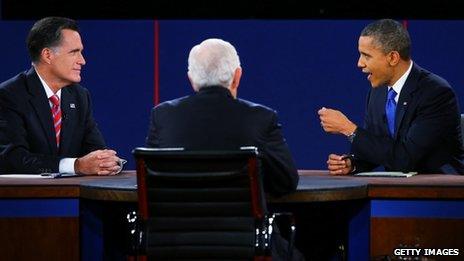
Featured in the three presidential debates were Romney, Obama, and Obama's thumb.
At the debates, the president frequently jabbed his hand, with his thumb resting atop a loosely curled fist, to emphasise a point.
The gesture - which might appear unnatural in normal communication - was probably coached into Obama to make him appear more forceful, says body language expert Patti Wood.
"It's a symbolic weapon," says Wood, author of Snap: Making the Most of First Impressions, Body Language, and Charisma.
"Speakers are coached to do it to look strong and mighty and to grab the attention of their audience, and in a political speech to emphasise strong points and to look like you are powerful."
On a subconscious level it's phallic, she says. "It's sexually male. Men put out their thumb and it says 'I am a man'."
And pointing the index finger is simply seen as rude and too aggressive.
Job titles are for life
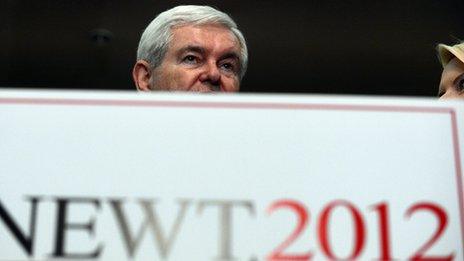
He's Mr Speaker to you - always
Mitt Romney was governor of Massachusetts for four years - and he left office almost six years ago. Yet he is still addressed as Governor Romney, as if that were a title of nobility rather than a political office.
The US has only one president at a time, but Bill Clinton and George W Bush are always referred to as President Clinton and President Bush - even in the same sentence as Obama.
And during the Republican primary campaign, Newt Gingrich was routinely referred to as Mr Speaker - even though he was the Speaker of the House for four years and left that post nearly 14 years ago.
As odd as it sounds to hear "Presidents Clinton and Obama" from a news presenter's mouth, the perma-title is acceptable, traditional and appropriate, says Daniel Post Senning, author and spokesman for etiquette arbiter Emily Post Institute.
"It really shows the esteem that we hold those offices in - that this is a democracy, and those are such important positions that it becomes like a professional title," he says.
"I liken it to when a judge or a doctor retires. They've invested a lot in their professional identity and many retain the use of their professional title.
Election loser can still win the White House
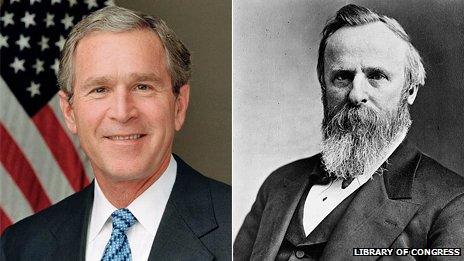
George Bush in 2000 and Rutherford B Hayes in 1876 lost the popular vote
Four times in American history, the candidate with fewer votes has wound up with the presidency.
That is because the winner of the presidential election needs to capture a majority of electoral votes, which are apportioned to the states by population and for the most part awarded in winner-take-all state contests.
The national presidential election is effectively 51 separate contests (50 states and Washington DC), with the winner of 270 electoral votes taking the presidency.
Most recently, in 2000 George Bush won half a million votes fewer than Al Gore but took 271 electoral votes for the victory.
It is entirely conceivable that the person sworn into the White House in January will once again be the man with fewer votes.
One scenario envisioned by analysts - Barack Obama could piece together enough states to win the electoral college and hence the presidency, while Romney wins populous conservative states like Texas and Georgia by a wide enough margin to take the national popular vote.
It could be a dead-heat - with a President Romney and VP Biden
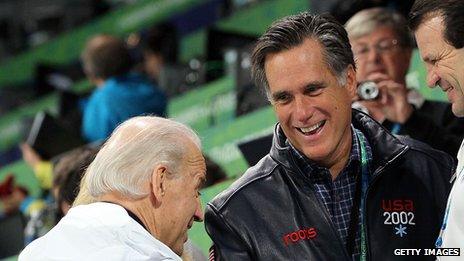
Biden and Romney have different political backgrounds
American politics is at its most partisan and polarised in more than a century, many analysts say. But it could get much, much worse - Romney could be elected president and Joe Biden re-elected vice-president.
Under the US constitution, external, if the electoral college (the sum of electoral votes from each state - 270 and you're president) ends in a tie - and there are several scenarios under which this could occur - the election is sent to the 435-member House of Representatives.
This is currently Republican-controlled and is unlikely to change hands, so they would choose Romney.
But under the same clause, the Democrat-led Senate would choose the vice-president - Joe Biden.
Biden might then be tempted to undermine Romney at every turn.
"A historic tie, which would spur demonstrations that would make the healthcare battle look like the Macy's Thanksgiving Day Parade, seems a logical conclusion of the bitter partisan paralysis here and the bottom-feeding campaign," wrote New York Times columnist Maureen Dowd, external last week.
Why the obsession with 'folks'?
Folks here in Iowa understand this - you cannot grow this economy from the top down - Obama, 17 October
I know that a lot of folks are struggling - Romney, 10 October
Obama and Romney use the word "folks" far more often than the word is typically heard from the lips of men with their socio-economic and cultural backgrounds.
The word, which finds its origins in the Old English, is in the US historically associated with the South. That's a stereotypically less-pretentious region that neither Obama nor Romney are from.
The word used as such is roughly the same as "people", but warmer and more inclusive, says Grant Barrett, editor of the Oxford Dictionary of American Political Slang.
"American politics is a southerner's game," says Barrett. "It's a talker's game and Southerners are talkers. At the national level we have often been dominated by Southerners."
Only a third of the US matters
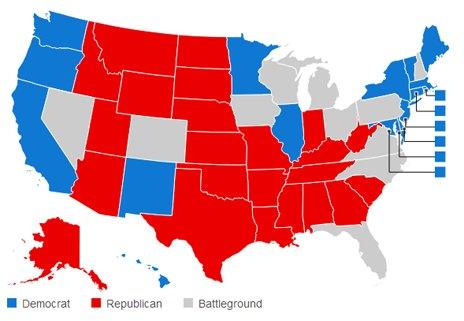
The blue and red is written off by campaigns when planning strategy
On 6 November, the election will effectively be decided by less than a third of the US population.
Most of the states in America, including four of the five most populous, are so solid in their support for the Republicans or the Democrats that the candidates do not bother campaigning there.
Instead, each side chalks up those safe states in their tally and fights over the remaining handful of swing states on their path to 270 electoral votes.
The election is thus decided by the roughly 30% of the US population which lives in the swing states.
For the 70% of Americans who live in California, Texas, Georgia, New York, Illinois and the 35 other safe states, their votes count toward the electoral college total, but they cannot be said to be relevant in deciding the election.
In North Dakota, you can vote without registering to vote

The only state where it is not necessary to register in order to vote is North Dakota.
Although it was one of the first states to adopt voter registration in the 19th Century, it abolished it in 1951. The North Dakota State Government website, external says the move can be explained by the state's close-knit, rural communities.
"North Dakota's system of voting, and lack of voter registration, is rooted in its rural character by providing small precincts.
"Establishing relatively small precincts is intended to ensure that election boards know the voters who come to the polls to vote on Election Day and can easily detect those who should not be voting in the precinct."
People coming to vote must be US citizens over the age of 18, who have lived in the precinct for at least 30 days, says Al Jaeger, the North Dakota Secretary of State. And people still need to produce identification, if they are not known to officials.
"I don't see any difference with any other states, except that we don't have voter registration, but it's the same result. It might be an oddity but it has the same purpose. Our elections have a great deal of integrity."
Additional reporting by Tom Geoghegan
The BBC will be providing full online live results of the US presidential election on 6 November.